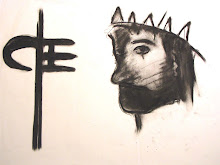
Charles Taylor (pictured at left) is a Catholic philosopher. Taylor, Alasdair McIntyre, Michael Sandel, Gadamer, Heidegger and Wittgenstein are all on one side of an important question in philosophy. The question is, Does the Cartesian project of radical doubt make any sense? They all answer negatively. In brief, they argue that human beings are cultural, social, group-raised-and-defined beings, and that the whole project of epistemology becomes questionable when you see human being in its social roots. Foundationalism won't work, they argue; and representational theories of knowledge won't work either. The ground on which these thinkers make their case is an examination of human being, including the conditions of human knowledge. They all argue that human being is a kind of cultural co-embeddedness, and that knowledge, rather than being a grounded structure, or pure receptivity, is a kind of agency that only makes sense in the context of things that we do with other people. So the image of the passive recipient of objective knowledge won't work. Knowledge in its root forms is social through and through and is agency through and through. So: the knower cannot detach from society, as Descartes wishes. And: the knower cannot detach from desire, planning, intentionality, as Descartes also proposes. So the Cartesian project fails.
An interesting side-note here is that by arguing against the Cartesian project, all these thinkers end up with right-of-center political views, in which social traditions, habits, cultural life-ways and social prejudices play a big role, perhaps even larger even than objective reason. Thus the church and traditional religion become important again, after the blows they suffered in the Enlightenment. This whole trend in philosophy is part of the Romantic reaction to the enlightenment.
The left wing that stands on the opposite shore here includes all thinkers who think that people have the power to detach from tradition and think dispassionately about reality without the intervening filter of cultural and social mores, traditions and prejudices. Descartes (pictured at right) is a founding figure here. Rawls is in this group, arguing for the possibility of thinking via the original position. Philosophers who focus on the individual, apart from society, are in this group, who see dangers in being absorbed into social groups and losing touch with objectivity because one has unconsciously taken on the attitudes of one's class, gender, caste, culture, religion, ethnicity or other contingent, situational belonging. Nietzsche, Kierkegaard, Schopenhauer, Freud, Emerson, Thoreau, Dworkin, Kant, William James and Hannah Arendt are all on this side, arguing for the individual's confrontation with the questions of existence, unmediated by social trends.
Can I understand myself and my world via my own thinking and work? --- or --- Do I necessarily rely upon, and expressly or covertly incorporate, the big reigning ideas from my society, cult, language, upbringing and zeitgeist? Are my views merely the consequences of where and when I was born, and who my parents were?
Tu weiming adds something interesting to this problem. He is saying, as a Chinese person, raised in a Confucian culture, I cannot get away from my background. But my attachment to my cultural tradition has freed me. My love for it has opened up the world for me. I can find my heritage and test the ideas that I care about in my encounter with other peoples' traditions. I can learn other traditions and languages and expand my world and my self-consciousness via my project in learning. He asks, but does not answer, the question: When I get into these gains from intercultural contacts, am I working towards finding the core of my existing beliefs, or am I beginning to take a step outside my sphere of cultural reference? Am I sentenced to a Confucian outlook because I was born into it, or can I change my outlook into something completely new? He seems to suggest that a new kind of human flourishing is possible via transcending narrow boundaries of self, cult, nation and geography. This is what he calls "spiritual humanism." He wants to rethink the humanist project: not as self or other, but as self and other.



No comments:
Post a Comment